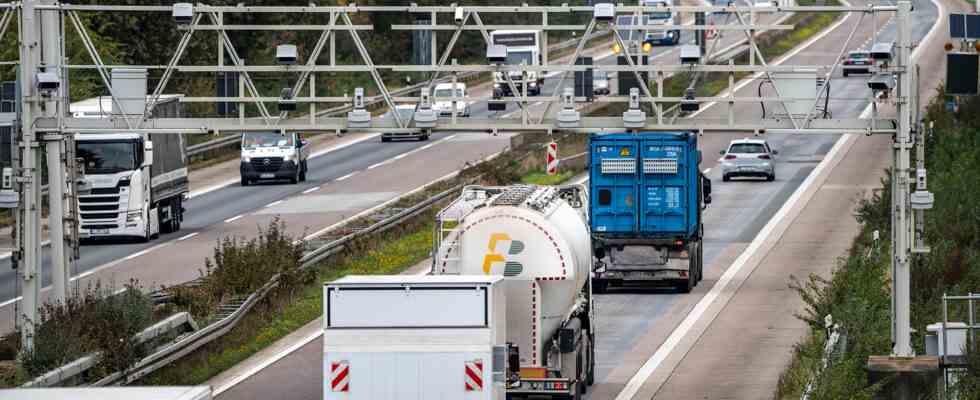Status: 03/24/2023 3:24 p.m
The warning strike in the transport sector announced for Monday has been criticized. The federal government is now calling on the parties to negotiations. Transport Minister Wissing is in favor of lifting the driving ban for trucks this Sunday.
Before the nationwide warning strike in the transport sector planned for Monday, the federal government called on the parties involved to negotiate an early solution. Government spokesman Steffen Hebestreit pointed out in Berlin that the right to strike is a fundamental right in Germany. In principle, however, one calls at the same time “that the collective bargaining partners soon find a viable solution so that the effects of such a strike are not too bad”.
According to his ministry, Federal Transport Minister Volker Wissing appealed to everyone involved to be aware of their responsibility and to keep the effects of the strike as low as possible. In order to keep the supply chains as stable as possible and not to endanger the supply, he asked the federal states to refrain from checking the Sunday driving ban for trucks. In fact, he spoke out in favor of a one-time lifting of the Sunday driving ban for trucks by the federal states. “We support that,” said the FDP politician in Mainz. In addition, state aviation authorities and airports are required to allow delayed landings and departures so that stranded passengers can reach their destination, the minister told the “Bild” newspaper.
Deutsche Bahn: No replacement timetable on Monday
The trade union Ver.di and the railway and transport union (EVG) have each called for a nationwide warning strike in transport in their own collective bargaining rounds for Monday. Long-distance and regional rail transport, airports, waterways and ports as well as the motorway company are to be affected.
In freight transport, Deutsche Bahn wants to give priority to trains that are relevant to supply. According to a company spokesman, however, there will be no emergency timetable for long-distance traffic. Too many professional groups were called to strike. According to the railway spokesman, the effects will already be felt on Sunday evening due to overlapping shifts.
Rail traffic to Austria is also affected. The Austrian Federal Railways (ÖBB) announced that there would be no cross-border local and long-distance trains. As a rule, they ended before the border. Night trains with German sections that start on Sunday and Monday are also affected.
Flight cancellations already on Sunday
Almost all German airports are also said to be on strike. Lufthansa passengers have to be prepared for significant failures as early as Sunday. Apart from humanitarian flights, there will no longer be any Lufthansa flights at Munich Airport, as the airline announced. However, Lufthansa assumes that flight operations can be carried out as normally as possible as early as Tuesday.
Employers warn: “Do not radicalize”
The Federal Association of Freight Transport and Logistics (BGL) warns of a supply chaos in view of the strike. The unions acted “against the will of millions of German citizens,” said association president Dirk Engelhardt of the “Bild” newspaper.
Germany’s employers also accused the unions of exaggerated action. “Anyone who acts like this is acting disproportionately and jeopardizes acceptance of the right to strike,” said the chief executive of the Confederation of German Employers’ Associations (BDA), Steffen Kampeter, of the dpa. He warned that the fight for members should not radicalize collective bargaining autonomy in Germany.
Unions defend warning strikes
The chairman of the service union ver.di, Frank Werneke, defended the strike. “A labor dispute that has no effect is a toothless labor dispute,” he said on the TV station Phoenix.
Werneke admitted that the joint strike with the EVG railway workers’ union would be a burden for many people, “but a day’s burden with the prospect of reaching a collective agreement is better than a week-long labor dispute.” Because it would not only affect the traffic areas, “but also hospitals, waste management companies and daycare centers,” said Werneke. He sees employers as having a responsibility to move about in collective bargaining.
Fahimi: “Demands are not unrealistic”
The head of the German Trade Union Confederation (DGB), Yasmin Fahimi, defended the demands of the union in the wage dispute. “They are necessary,” she told him SWR in an interview scheduled to air on Saturday. The result at the post office, where an average tariff increase of 11.5 percent was achieved across all income groups, also shows that the demands are “not at all unrealistic”.
In the collective bargaining dispute in the public sector, an increase in wages and salaries of 10.5 percent is currently being demanded, while the negotiating union EVG is demanding a twelve percent increase in wages for the railways. Fahimi said to that SWR, there is both a “pent-up demand from 2022 with a record inflation” and a forward-looking perspective. “Because this year, inflation won’t exactly drop to two or three percent again,” she said.
Fahimi also warned against restricting the right to strike: “You don’t play with that,” she said ZDF. “And I can only advise against speculating whether the right to strike shouldn’t be restricted in Germany. The right to strike in Germany already has its limits: political strikes, such as those against the pension reform in France, are not possible in this country.
DIW President: Strikes will increase
The head of the German Institute for Economic Research (DIW), Marcel Fratzscher, expects an increase in strikes in the coming years. The labor market is developing into an employee market. There are already two million vacancies in Germany today and a huge shortage of skilled workers, which will only increase in the next ten years.
“The labor dispute and the mega strike in the transport sector next Monday are the logical result of this turning point,” said Fratzscher. “I expect a significant increase in labor disputes in Germany in the coming years.”

